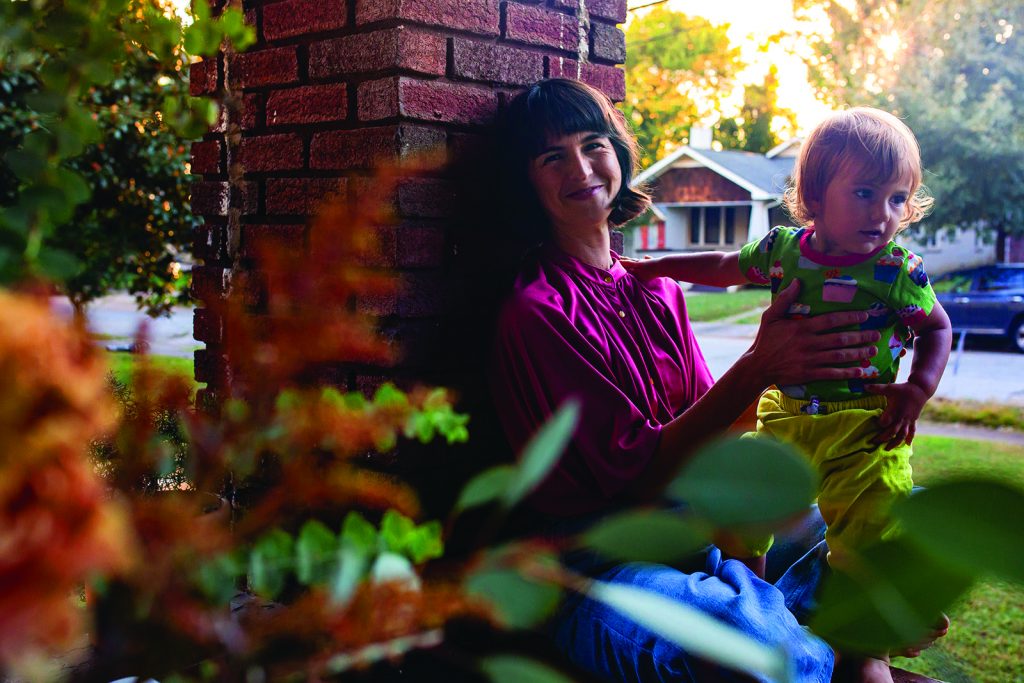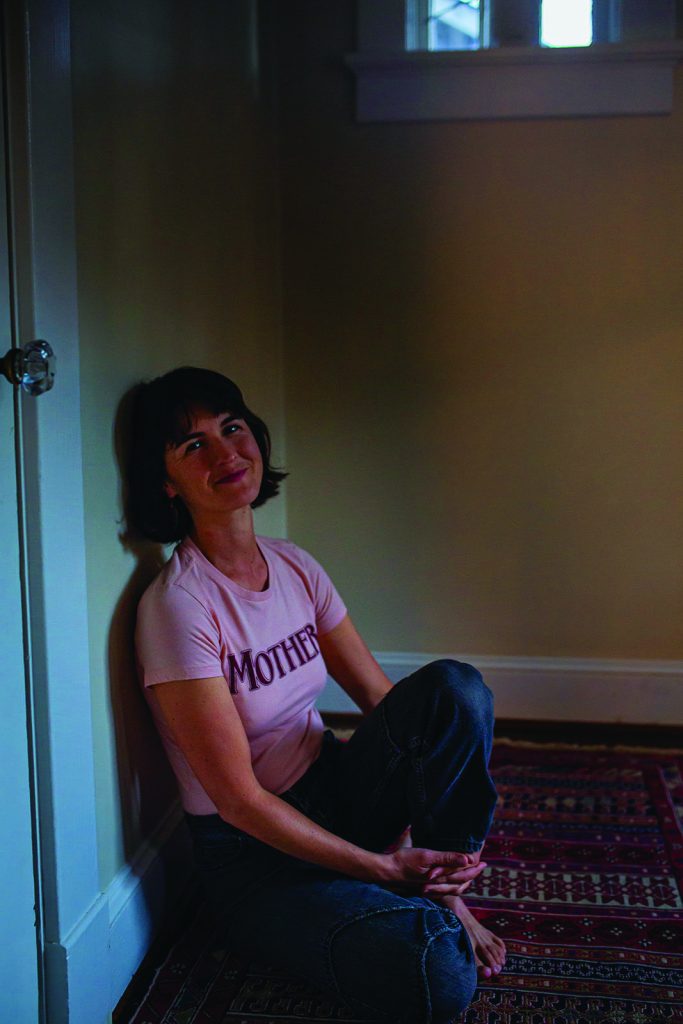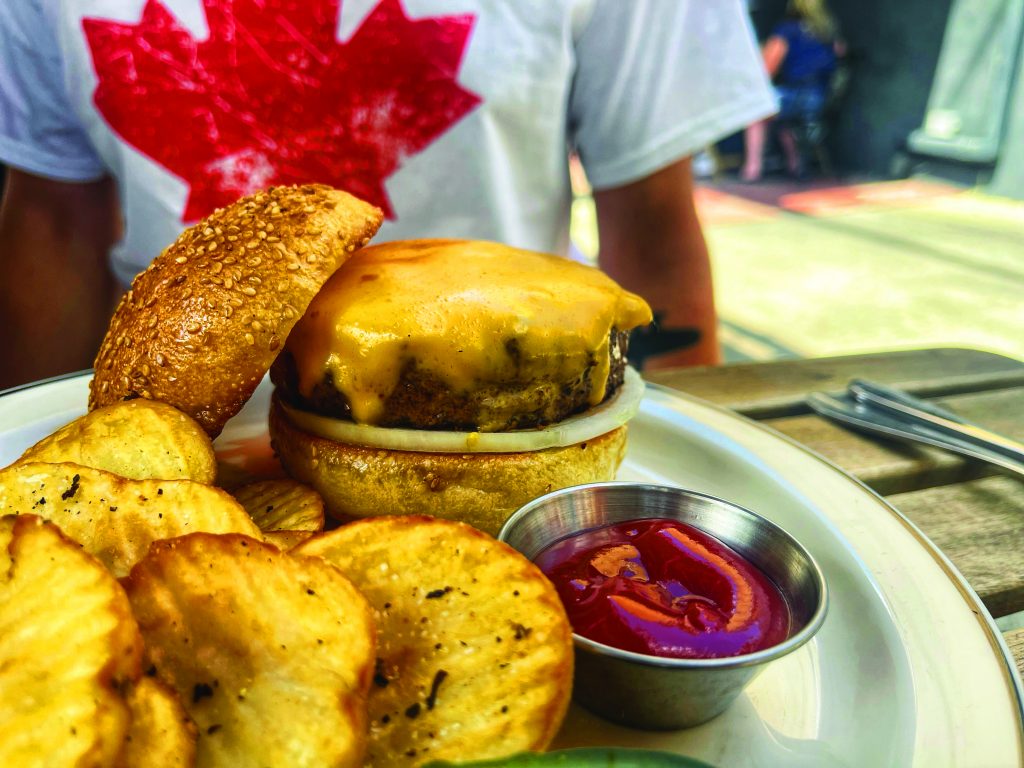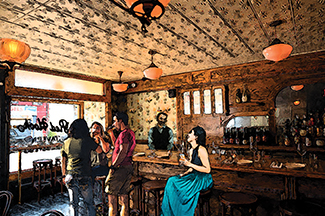
I first meet the Anna Carapetyan on the phone, although, I’m pretty sure we were either related, married, or ruling a huge country in a past lifetime, sans colonialism. She is a Brooklyn Doula, I am a writer, and we have a lot in common, and I mean A LOT. For starters, we are both mothers. Anna is a mother to two small children, ages 7 and 3. I am a mother to three small children, ages 7, 5, and 3. We both graduated high school the same year. Our birthdays are almost numerically identical. Also, we have the same first name! As these details begin to unfold during two deep conversations, I feel the need to rip off all my clothes and yell “This is amazing!” to the sky but I don’t want to scare my new friend. And besides, the most common detail Anna and I have in common are none of these witchy coincidences. Instead, what we connected on the most was the idea of the internal self and how it relates to the “befores” and the “afters” of motherhood. Or, as Anna puts it: “The loud voice of our past versus the wise woman ahead, who’s there, but she’s very quiet. We must lean in to hear her.” I know, I know, why didn’t we all marry this woman?
I call Anna on a warm Wednesday afternoon. Her voice matches the weather. She’s kind and open, the way only seasoned women who have frequently stood in a room at the precipice of life and death can be. If there is fear or anxiety about our interview, I can’t tell. Anna exudes a sense of comfort and grace. So, it makes sense that when I ask her about her background, how she became a doula, and what led her to where she is now, her story unfolds the way a secret note might. Anna’s journey has depth and I have a desire to hear what she has to say again and again. I want to catch her wisdom in my hand and so we begin:
Me:
It’s so nice to meet you, thank you for agreeing to do this over the phone. So, I guess I’ll start with where are you from and what sparked your interest in becoming a doula?
Anna C.:
I’m originally from Austin, Texas but I graduated high school in 1999 and then I went to SUNY Purchase where I studied dance. I was a professional dancer after college, and I also babysat and waited tables to make extra money. The human body, healthcare, and even self-care was the initial spark for me in terms of becoming a doula. Birth always held an interest for me, the process of birthing another human being.
Me:
Did you know immediately that you wanted to be a doula because of this interest in birthing another human?
Anna C.:
No, not really. I mean, I thought I wanted to be a midwife first because a lot of my friends started having children in their late 20s and so I really thought a lot about becoming a midwife.
Me:
So, you were drawn to the process when you saw all your friends having babies and something changed in you, or was it also something else?
Anna C.:
Well, I mean, initially yes, I saw my friends having kids and this idea of the “event” of how a body comes out of a body really drew me in. The health process and the “body-event” of birth was also somewhat related to my dance background. But the physiological and anatomical event of how a body comes out of a body held and still holds a huge fascination for me.
Me:
I mean, I don’t know if you feel this way but after I had kids, I understood why the whole world is afraid of women.
Anna C.:
That’s so interesting, what do you mean by that?
Me:
I mean, I felt like I could have played in the NFL the day I birthed my children, and I absolutely could have won. Move over Tom Brady! The strength I felt. It’s sort of beautiful and depressing but I felt like that day was the first day in my whole life as a woman when I truly loved myself, all of myself, and I could see how magnificent I was as a being on this planet. And then there’s this idea of who I was before that moment forever changed me, and who I am now, and maybe who I am going to be.
Anna C.:
This is so amazing because I think a lot about that. I think so often about the woman I used to be versus the wise woman I am continuing to grow into. There is the loud voice of our past versus the wise woman ahead, who’s there, but she’s very quiet. We must lean in to hear her. I often think that the voice of the past is so loud it is drowning out the future self’s voice. Some days it is so difficult to grapple with these two selves.
Me:
Can I stay on the phone with you for the rest of my life!?!? Yes! But those two selves are so necessary, one can’t exist without the other.
Anna C.:
Oh, absolutely. And my experience as a doula before and after my experience as a mother has changed drastically.
Me:
How so?
Anna C.:
Well, I did first time doula work for three years. I trained as a doula, got certified, and then I worked for three years. But when I birthed my own baby, I had more of a foundational understanding of what it means to birth a child.
Me:
What changed specifically?
Anna C.: There was just a significant shift from being almost passive about the birthing process to being truly connected to it as well as truly connected to the post-partum process.
The next time I meet Anna, it’s on a muggy Monday in Park Slope. We meet at Bank Street coffee on Flatbush Avenue, and I spot Anna first because she’s got a cute pixie haircut, a flowy skirt, and an aqua blue button down on. But what I really notice is how she’s holding a huge backpack like a newborn. “There’s my Brooklyn doula!” I say while crossing Flatbush to meet her. We’re waving to each other already, our hands like four S.O.S. flags of motherhood in the distance. For some reason, my children and Anna’s children had separate meltdown mornings at home before our meeting. I wonder if it’s too early for tequila, but we settle on cappuccinos and ease into our seats as the barista foams our milk. My before-self sneaks up on me and I picture the two of us as eighth graders with side ponytails chewing bubble gum and making lanyard friendship bracelets. But here we are in the present moment, exhausted mothers, wise women of the Brooklyn village. Today our coffee talk begins with what it’s like raising children in Brooklyn, how to deal with meltdowns, and how hard we are on ourselves, the difficulties of forgiving ourselves, and what it means to fall apart. Today, we’re both at the tail end of that list.

Anna C.: It’s been a rough morning.
Me: Yeah, I totally get it. This is a nice coffee shop.
Anna C.: It is, I like it here.
Me: Ok, so the last time we spoke we talked a lot about what it means to step into this new self. I think one of the challenges for me is that I’ve had a few moments since birthing my children when I really feel like I am falling apart.
Anna C.: Oh, absolutely. I had a morning like that today. Especially during and after the pandemic, the “falling apart” can take on many meanings.
Me: It can. I’m sure you and I had similar experiences with having a baby right before the pandemic hit. Can you tell me about that and about where you’re headed in terms of your practice?
Anna C.: Well, it’s interesting, when my youngest was born we moved away. We drove to Texas, and I did fall apart. Yet, it was a productive falling apart.
Me: In what way?
Anna C.: Well, I started to realize some things about what we experience internally after birth. It’s like what makes it hard is so different from what makes it hard. I don’t know if that makes sense when I say it but it’s true. I’ll say it again. What makes this experience hard is so different from what makes this experience hard.
Me: The internal experience is always so difficult to explain. I went back to work two weeks after my youngest was born because I had to make a living. Now that sounds crazy, but I had tunnel vision and I think my body has suffered tremendously because I did that. I’m just now, at 42, after three children, learning to listen to my body.
Anna C.: There is absolutely an internal experience, and that goes from internal self to the identity shift we were talking about last time. There is a former self we shed, and a shift to a social self and all these factors taking place. But it can also be a moment of self-discovery. After I had my productive falling apart, I realized that as a doula, I’m not just a “doer”, I actually have something to say. I have something important to say.
Me: What is it that you have to say?
Anna C.: So much, where do I begin? I’d like to start with the question of why is this internal experience a problem? What is challenging for people with these internal experiences and how can I facilitate an easier path for them post-birth, early-birth, even after the first year of motherhood. How can we find and learn to express what is happening inside of ourselves even into our children’s toddlerhood? Some women are also experiencing perimenopause and post-partum around the same time.
Me: I think I’m going through that. I had no idea that post-partum can last for three years.
Anna C.: Yeah, oh yeah. They’ve discovered a lot of new research about that.
Me: I fell apart much later, after my third child. During the pandemic it was easy for me to hunker down with the kids. Coming back out into the world has been the hardest thing for me and you’re right, I have no way to express what is going on inside of me.
Anna C.: Those internal experiences that we don’t quite have words for are the reason I have a lot to say. I think the need for a deeper kind of care even after the newborn stage is crucial after birth.
Me: Care for the mother?
Anna C.: Yes, for the mother, but also for the mother and child, and family as a whole. We all need care. The whole family.
Me: We do.
Anna C.: We really do.
I talked to Anna for two hours. It was like sitting on a cabin porch with a knitted quilt wrapped around me. Later, I stalked her Instagram and found the real gold nuggets of her practice. In a world of insecurity, anxiety, and fear, Anna Carapetyan reminds us through her own experiences of the fragility and sacred nature of life. To care for ourselves, all of ourselves, and to care for our children while caring for ourselves truly takes a village. I close her Instagram page after I read the one post I was meant to linger with. It is a video of Anna speaking to the camera after a back injury. Even in her own pain she guides us as she speaks:
When we’re recovering from birth, illness, injury, pregnancy loss or termination, going through a grief process or other life event that necessitates the support of family and community, we learn about our comfort and our edges.
It can be hard to allow people to care for us. When it is hard, it’s also an opportunity for growth.
There’s a point in the process when the opportunity is especially alive.
It’s not when the pain or the learning is most acute and claiming the majority of our attention. It’s usually pretty easy to accept support then.
Birth parents I work with will usually let me spoon feed them their first meal after birth, but a week later it’s much harder to get them to allow me to heat up a meal or bring a snack to their bedside.
It’s when we’re feeling just strong enough to get up and go through the house picking up laundry we’ve strewn about or stand at the stove heating up our own soup.
*It’s when we know we could do those things but it would cost us energy that could otherwise be used for further recovery and re-building.*


